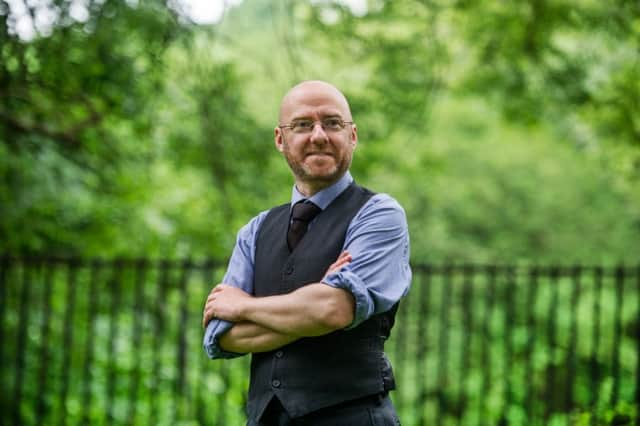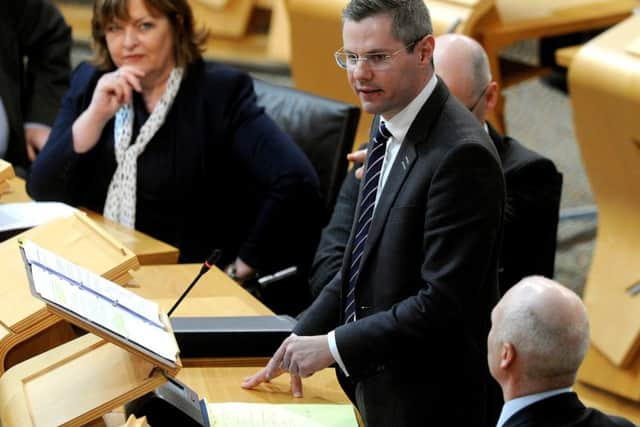Greens pressure finance secretary Derek Mackay over income tax


The Finance Secretary has been told income tax rises are essential to fund public services properly by Patrick Harvie, the co-convener of the Green Party which holds the balance of power in the Scottish Parliament.
Harvie said Mackay must resist those arguing against raising taxes in Scotland and use the new powers of the Scottish Parliament for a radical restructure of the system to create a more progressive model.
Advertisement
Hide AdAdvertisement
Hide AdLast week’s UK Government Budget saw Chancellor Philip Hammond announce an extra £2 billion for Scotland over the next three years, a sum that saw the Tories argue that there was no need for income tax rises north of the Border.


But speaking to Scotland on Sunday, Harvie vowed to press the Scottish Government hard for tax hikes ahead of the negotiations between parties that will determine if Nicola Sturgeon’s minority government can win enough support to pass its budget. The Scottish Government has signalled it intends to raise income tax in Scotland. But traditionally it has relied on support from the Greens, who are pursuing the most radical package of all Holyrood parties by proposing tax increases that penalise those paying basic and higher rates.
Harvie said the Scottish Government’s failure to reform the local taxation system meant raising income tax was the only way to pay for public services.
“The Scottish Government stalled on local tax reform. I think that’s very regrettable, but it does mean that if it wants to meet its own commitments – never mind getting a broader consensus across the parliament about other commitments – they are going to have to look at significant tax changes,” Harvie said.
“I really think there is a political advantage in restructuring income tax – not just raising enough revenue and closing inequality, but ending this myopic debate which we are going to have otherwise. Are we doing exactly the same as the UK Government or are we fiddling with this rate or that threshold by a tiny margin?


“Our approach is not just about raising from the top earners but having a more progressive approach generally, so you would reduce tax for the majority of taxpayers certainly all those below a national average full- time salary equivalent.”
Of the £2bn announced for Scotland by Hammond £1.1bn will come in form of “financial transactions” – which can only be used for a limited range of purposes and have ultimately to be repaid to the Treasury.
Harvie argued that because the financial transactions could not be spent on public services, there was still a need for income tax rises to pay for the SNP’s pledge to maintain NHS spending and to scrap the one per cent cap on public sector pay.
Advertisement
Hide AdAdvertisement
Hide Ad“You can’t do all those things unless you are willing to look at the income tax side of things. That means not just do you put one rate up or down a bit, but restructuring to make the system fairer, protect low earners but making sure that people like myself and Derek Mackay who can afford to pay a bit more tax do so.”
The Greens believe income over £150,000 should be taxed at 60 per cent, compared with the current rate of 45 per cent. Higher earners (in Scotland those earning more than £43,000) should see their rate increased from 40 per cent to 43 per cent.
The basic rate – currently 20 per cent – would be split so that income over £19,000 would be taxed at 22 per cent. Income on top of the personal allowance and below the new threshold of £19,000 would see a cut to 18 per cent.
Hammond’s budget saw more divergence between the tax systems north and south of the Border. The Chancellor raised the level at which high-earners enter the 40 per cent tax band to £46,350 from 2018/19 – a tax break that does not apply in Scotland.
South of the Border the UK Government also abolished stamp duty for first-time buyers purchasing homes up to the value of £300,000. As well as being under pressure to raise income taxes, Mackay is facing calls from the Conservatives to adopt something similar in Scotland where Land and Buildings Transaction Tax (LBTT) has replaced Stamp Duty.
At the moment house-buyers are exempt from LBTT for properties up to the value of £145,000.
Faisal Choudhry, head of Savills residential research in Scotland, said the Scottish Government should try and use LBTT to match the Chancellor’s Stamp Duty commitment, arguing that thousands of Scottish first time buyers would benefit from such a move.
According to Choudhry, in the past 12 months (quarter 4 of 2016 and quarters 1,2,3 of 2017) 5,600 first time buyers in Scotland took out a mortgage to buy a property valued between £175,000 and £250,000.
Advertisement
Hide AdAdvertisement
Hide AdOn average that particular group of first-time buyers, which represents 16 per cent of total first-time buyers in Scotland over the last year, paid £1,350 in LBTT.
A Scottish Government spokesman said: “Our action in 2015 to replace Stamp Duty (SDLT) with the fairer Land and Buildings Transaction Tax (LBTT) prioritises support for first-time buyers and assists people as they progress through the property market – and due to the higher zero rate threshold and lower house prices in Scotland, approximately two-thirds of first-time buyers in Scotland do not pay any LBTT, which has taken almost 24,500 additional house purchases out of tax altogether since its introduction.
“Analysis from the OBR, the UK Government’s own independent forecaster, shows that the UK’s SDLT change will simply feed through to higher house prices and will benefit those who already own property, not the first-time buyers.”
On the prospect of income tax rises, the spokesman added: “We have started a conversation to look at how best to use our income tax powers.”